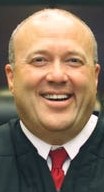
Ask Judge Smith
The story on caseloads and the clergy privilege

Q. Judge Smith, now that you have served as both a county and a circuit judge, how do you find the two jobs compare? Also, why are judges addressed “your honor?” Thank you, Alice
A. Alice, I have found both jobs to be incredibly humbling and rewarding. Humbling because of the responsibility those jobs entail and the faith that two governors and the voters placed in me. Rewarding because the work is intellectually stimulating, and I care deeply for the people I serve.
County judges enjoy helping people through the legal process. They handle large dockets of recurring but less complicated cases. As a county judge, I often worked on over 100 case files per day.
Circuit judges handle significantly smaller dockets, but their cases tend to be more complicated and involve more significant risks for the parties. Circuit work provides greater variety and requires constant reading, writing, and listening. On Jan. 4, 2021, my chief judge assigned me to cover one-third of the circuit civil cases in Leon County. As a circuit civil judge, I often work on five to 10 case files per day.
Every human is fallible, some more so than others. Notwithstanding, judges are entrusted with great power. Quoting Spiderman’s Uncle Ben, “with great power comes great responsibility.” Since feudal times, judges have been addressed as “your honor” because society expects them to live up to the title.
Addressing a presiding judge in court as “your honor” shows respect for his or her constitutional and statutory authority.
Q. Judge Smith, I am a practicing Catholic. Hypothetically speaking, if a parishioner admits to committing a crime during confession, can the state force the priest to testify? Mary Katherine
A. A private communication between a member of the clergy and a person is confidential if made to seek spiritual counsel and advice. Let’s consider two examples.
Suppose Jeffrey visits a church. It doesn’t matter if he is a church member or a first-time visitor. In his private confession to a priest, Jeffrey admits to murdering his next-door neighbor and asks for absolution.
If charged with the crime, the state cannot force Jeffrey to reveal his admission to the priest. Suppose the state calls the priest as a witness. In that case, Jeffrey’s lawyer can prevent the priest from testifying by objecting and asserting the “clergy privilege” (Florida Statute Section 90.505).
Suppose Gwenn attends her neighborhood Methodist church. During the Sunday morning service, Gwenn announces she has sinned by embezzling $10,000 from her employer.
Gwenn’s admission was not confidential, and the “clergy privilege” does not protect her confession. The state can call anyone who overheard her confession as a witness.
The Honorable J. Layne Smith is a Circuit Judge and author of “Oswald on Trial —Making Sense of the Evidence,” and “Civics, Law, and Justice — How We Became U.S.” Send your questions to askjudgesmith@gmail.com.







